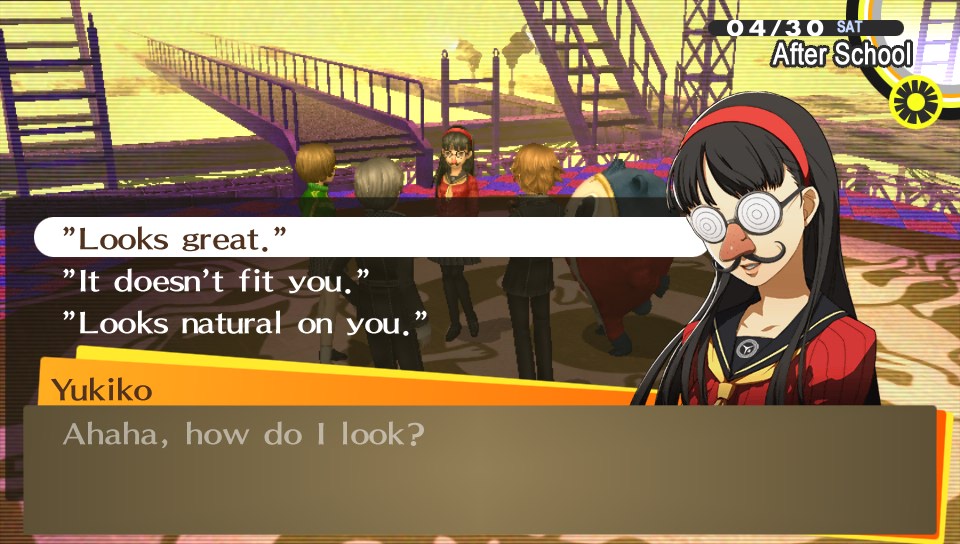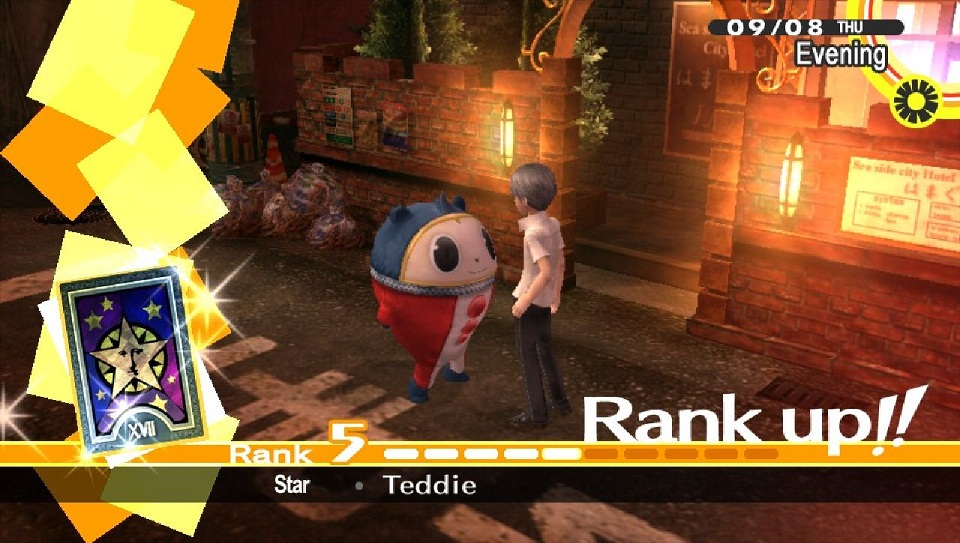Persona 4: Everything Sunny All the Time Always
By m3ds334 7 Comments

I beat Persona 4 Golden a few weeks ago and it proved to be one of the most enjoyable experiences I've had in recent memory, and I've been thinking about what made it so special. Mechanically, balancing classic turn based fighting with managing your time in the day-to-day life of a high school student keeps things from every feeling too stale. When ever I got bored of one, I'd focus on the other. The game is full of charm, with likeable characters, catchy tunes (for at least the first twenty hours), and some genuine hilarity. The game does a lot of things right, but isolating those things from the game doesn't really account for made the game so special to me. However, Persona 4 preaches a message of absolutely foolish optimism, and I loved every second of it.
Many games today feature a grim dark plot, where the main character is an alcoholic, and he's just trying to do the lesser of two evils, and I do love these. And it's not just me, over the last twenty years, the rise of the antihero in all forms of media has really come into it's own. Shows like Dexter, Mad Men, and Breaking Bad all portray protagonists who are fallen in some form or another, and solve their problems through questionable means. Juxtapose this with Persona 4 where the problems of the various characters, though actually similar in nature, are greatly scaled back. Walter White is looking to protect and provide for his family's future, while Chie is looking to protect her friends from bullies. Further, a lot of the problems in Persona are solved through things like friendship and believing in yourself. These ideas are not uncommon, especially for Japanese games, and normally my pessimistic nature forces me to turn my nose up at such things, but something about Persona 4, managed to do the opposite. Instead of being innocuous banter, a lot of the messages in the game resonated with me, and I don't think it's just one piece of it that enables such emotional echos. The game's writing, mechanics, and really marriage of the two is what allows the game to be so effective.

One of the major reasons the solutions of friends and faith in yourself actually work in the game is because of the rational writing. If you're unfamiliar with the structure of Persona 3 & 4, you fight monsters in classic jrpg style, and manage your time with various friends. Each friend has their own set of issues that they are dealing with. It's in each characters little story arc that some of the best writing can be found. This is because a lot of the hardships these characters face are problems that a person may have faced back in high school, or are still facing today. Problems like not wanting to follow our parent's plans for our lives, identity, or trust issues. The main character often acts a counsellor or therapist as the various people in his life hash things out and come to their own realizations that ultimately lead them to overcome the problem. Persona shows it's lofty optimism here, but never in a way that's too magical. It's always a slow progression, and never a deus ex machina, but rather something the characters have always had the power to do, but didn't realize. Further, many of these tribulations are fixed by a change in the perception of the character, one that closely resembles that bright tone of the game. And it's actually encouraging to be a part of, just as being around positive people in real life is actually encouraging.
Along with the games faith in personal relationships to help out lives, Persona always looks to reinforce the idea that conflict and power are a means to an end. When you max out a social link with one of the characters, they usually have a moment of self realization, reflect on what they've learned, and thank the player for the help in getting them here. With the main circle of friends, it's also stated that their own personal liberation and increase of power will first and foremost, allow them to protect you and the others. The abilities gained are never about “look how great I am,” but rather “look how much closer we can be.” It's also in this area where the game really couples this story of relationships with it's combat as these abilities really do grant them the ability to protect the group. Not just in the, they have more HP and damage output, but they gain the ability to take a mortal blow for the main character and gain “spells” that buff the party.
This marriage of story and gameplay doesn't end here, this bond is strongest in the game's social link system. Persona 4 allows the player to create stronger persona's based on the relationships with the other characters. Know Chie well, you can fuse a much higher level persona under Chie's sign. Now, lots of other games do offer bonuses if you spend time with your party. Dragon Age is a perfect example. That game's approval system grants stat bonuses to the various characters, but from just a combat effectiveness stance, they really aren't the necessary. If one were to approach the combat in Persona 4 without any of the social links, the game would be a much more vexing experience. Instead of instantly levelling a persona a half dozen levels, you'd have to grind the various dungeons for a few hours to achieve the same result. With these mechanics alone, Persona 4 manages to say that, turning to friends in life when adversity arises is what allows us to overcome problems without such great injury. This message is pretty basic, and I'm sure for a lot of people find it rather redundant, but I think for a lot of people who play video games, people like myself, it's easy to be the sort of person who tries to solve their own problems, and Persona 4, through gameplay and story, tries to tell us that we can't do it all on our own, but need to seek out the aid of those closest to us.

Now you could say this is a very shallow message, best left for more youth orientated games, and that more adult games should convey deeper messages, but what do more mature games encourage through their mechanics? I realize that there is lots to learn from more traditional games, even just at a technical level where processing visual information is being taught, but I'm more referring to social lessons that those games teach. I can think of very few games that convey such a positive message through the internal structure. Even games like Zelda, it's usually Link's own self reliance that gets the job done. Other than being granted light arrows by Zelda, Link's relationship with most of the characters has more in common with a contractor than with the give and take of friends. All this is to say, that in a world with so many games that encourage isolation and the pursuit of power for one's own needs, I would gladly welcome more games that ask us to consider those around us.
